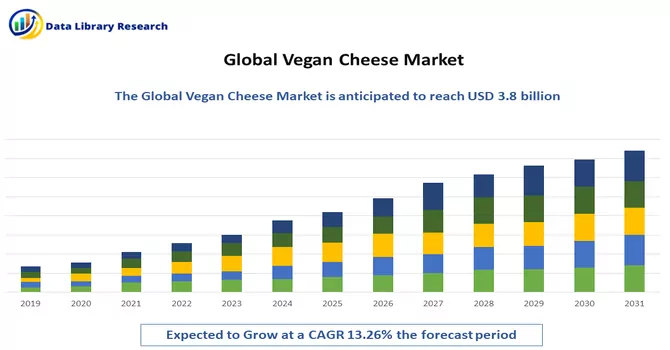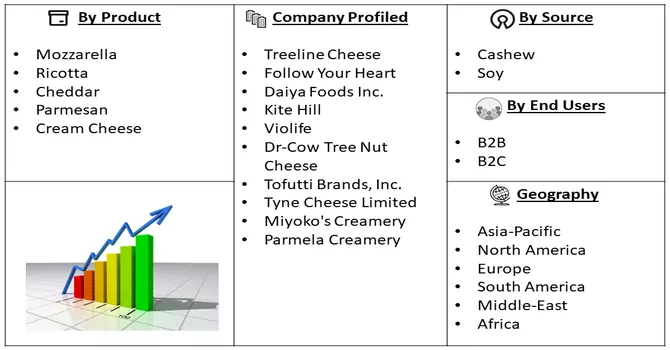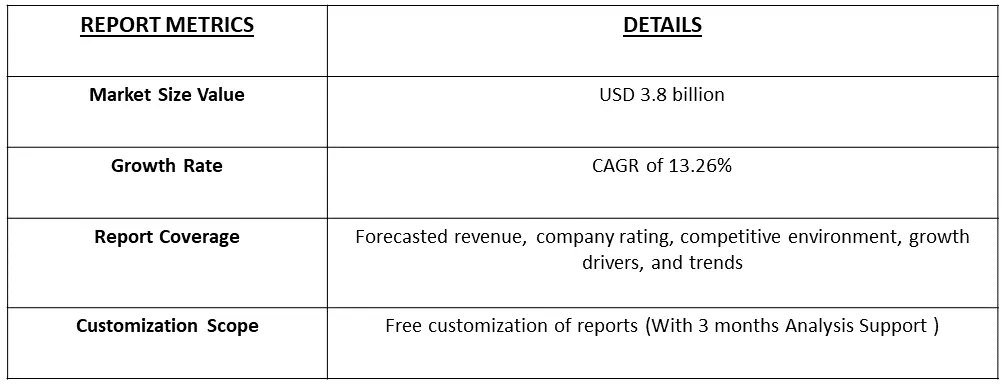The global vegan cheese market size was USD 3.8 billion in 2023 and is expected to grow at a compound annual growth rate (CAGR) of 13.26% from 2024 to 2031.

Get Complete Analysis Of The Report - Download Free Sample PDF
Vegan cheese is a plant-based alternative to traditional dairy cheese, designed for individuals who follow a vegan diet or those who are lactose intolerant. It is crafted without any animal-derived ingredients, such as milk or dairy proteins. Instead, vegan cheeses are typically made from plant-based sources like nuts, seeds, soy, coconut, or other non-dairy ingredients. The production process often involves blending and fermenting these plant-based components to achieve a texture, flavor, and meltability similar to conventional cheese. Vegan cheese comes in various forms, including slices, shreds, blocks, and spreads, and it is used as a substitute in recipes that traditionally call for cheese. The growing popularity of plant-based diets and dietary preferences has led to an expanding variety of vegan cheeses available in the market, offering options for those seeking cruelty-free and dairy-free alternatives.
The expansion of the vegan cheese market is being propelled by the increasing adoption of veganism, particularly among the millennial demographic. This demographic shift is attributed to a heightened awareness of issues related to animal cruelty and the environmental repercussions associated with conventional dairy production. As consumers become more conscious of the ethical and environmental aspects of their dietary choices, there is a growing inclination towards plant-based alternatives. The recognition of the adverse impacts of the dairy industry on animal welfare and the environment has prompted individuals to opt for plant-based products like vegan cheese. This changing consumer mindset, driven by concerns for animal rights and environmental sustainability, is a significant driver behind the rising popularity and acceptance of vegan cheese within the broader market.
Market Segmentation: The Vegan Cheese Market is Segmented by Product (Mozzarella, Ricotta, Cheddar, Parmesan, and Cream Cheese), Source (Cashew, and Soy), End Users (B2B and B2C) and Geography (North America, Asia-Pacific, Europe, South America, Middle East, and Africa). The market size and demand forecasts for the pump market in revenue (USD billion) for all the above segments.

For Detailed Market Segmentation - Download Free Sample PDF
The vegan cheese market is undergoing dynamic transformations, driven by evolving consumer preferences and a rising demand for plant-based alternatives. One notable trend is the remarkable expansion of product variety, with manufacturers introducing a diverse range of flavors, textures, and formats, including artisanal and aged cheeses. Clean label ingredients have become a focal point, as health-conscious consumers increasingly seek vegan cheese products with transparent ingredient labels, free from additives and artificial flavors. Functional ingredients, such as probiotics and fortified options, are gaining popularity, aligning with the broader interest in plant-based products offering health benefits. Sustainability is a key concern, leading to a surge in demand for vegan cheese with eco-friendly packaging solutions. The market has also witnessed a rise in dairy-free cheese alternatives, appealing not only to those following a plant-based diet but also to individuals seeking lactose-free options.
Market Drivers:
Availability Of Information on the Health Benefits, Environmental Impact, and Ethical Considerations of Vegan Cheese
The accessibility of information regarding the health advantages, environmental implications, and ethical aspects associated with vegan cheese has emerged as a pivotal catalyst in fostering widespread acceptance within the market. Consumer education initiatives have played a fundamental role in reshaping perceptions and influencing preferences. As consumers become more informed about the positive health outcomes linked to plant-based diets, the environmental sustainability benefits, and the ethical considerations surrounding animal welfare, they are increasingly inclined to opt for vegan cheese. The dissemination of knowledge through various channels, including online platforms, educational campaigns, and nutritional guidance, has empowered consumers to make conscientious choices aligned with their values. This heightened awareness not only contributes to the growth of the vegan cheese market but also reflects a broader societal shift towards more sustainable and ethical food consumption practices.
An Increasing Awareness of Health and Wellness has Driven Consumers to Seek Plant-Based Alternatives, Including Vegan Cheese
A growing consciousness of health and well-being among consumers has become a driving force behind the inclination towards plant-based alternatives, with a particular emphasis on vegan cheese. This heightened awareness stems from the belief that embracing plant-based diets plays a substantial role in enhancing overall health and mitigating associated health risks. As consumers become more informed about the nutritional benefits of plant-based choices, including the potential to reduce the risk of certain health issues, the demand for alternatives such as vegan cheese has seen a considerable uptick. The perception that plant-based diets can contribute positively to one's holistic well-being has led individuals to incorporate these alternatives into their dietary preferences, marking a significant shift towards healthier and more mindful consumption patterns. This trend reflects a broader cultural shift where consumers actively seek options that align with their health-conscious lifestyles.
Market Restraints:
Limited Shelf Life
The shelf life of vegan cheese products is often shorter in comparison to traditional dairy cheeses, which can have implications for storage, distribution, and overall market accessibility. This reduced shelf life may necessitate more vigilant inventory management and quicker turnover in retail settings. Challenges in maintaining an extended shelf life could impact the ability to reach distant markets and may require more localized production or distribution strategies. Additionally, considerations for refrigeration during transport and storage become crucial to preserve the quality of vegan cheese products. As the industry continues to address these challenges, innovations in packaging and preservation methods may play a pivotal role in enhancing the shelf life of vegan cheese and expanding its reach in the broader market landscape.
The global vegan cheese market experienced a nuanced impact from the COVID-19 pandemic, characterized by disruptions in supply chains and production processes. Lockdowns and social distancing measures posed challenges to manufacturing, leading to fluctuations in product availability. The shift in consumer priorities towards health and wellness, coupled with changes in shopping behaviors, influenced the purchasing dynamics and retail strategies within the market. The closure of restaurants and foodservice establishments initially affected demand, but the resurgence post-reopening showcased adaptability. E-commerce witnessed substantial growth as consumers turned to online platforms for their purchases. Despite challenges, the pandemic stimulated innovation in the vegan cheese sector, with companies investing in research and development to introduce new products and flavors. Overall, the pandemic underscored the resilience of the vegan cheese market, prompting adaptation to evolving consumer trends and reinforcing the importance of sustainability and plant-based choices.
Segmental Analysis:
Parmesan Segment is Expected to Witness Significant Growth over the Forecast Period
Parmesan vegan cheese is a plant-based alternative to traditional Parmesan cheese, catering to the growing demand for vegan and dairy-free options. Crafted to replicate the distinctive nutty and savory flavors of Parmesan, this vegan version typically utilizes plant-based ingredients such as cashews, almonds, nutritional yeast, and various spices to achieve a comparable taste and texture. The absence of dairy makes it suitable for individuals following a vegan or lactose-free diet and those with dairy allergies. Parmesan vegan cheese has gained popularity not only among individuals adhering to a plant-based lifestyle but also among consumers seeking sustainable and cruelty-free food choices. It can be used in a variety of culinary applications, including sprinkling on pasta, salads, or pizzas, and serves as a versatile ingredient in plant-based recipes. The availability of Parmesan vegan cheese reflects the broader trend of innovation within the vegan cheese market, providing consumers with flavorful and ethical alternatives while contributing to the diversification of plant-based options in the culinary landscape.
Soy Segment is Expected to Witness Significant Growth over the Forecast Period
Soy-based vegan cheese is a plant-derived alternative that caters to individuals seeking dairy-free and vegan options. It is crafted from soy, a versatile legume known for its protein-rich composition and neutral flavor profile. Soy-based vegan cheese typically involves the processing of soybeans into various forms, such as tofu or soy milk, which serve as foundational ingredients for cheese production. The transformation may include fermentation, seasoning, and texturizing to replicate the taste and texture of traditional dairy cheese. Rich in plant-based proteins, soy-based vegan cheese offers a nutritious alternative for those adopting a vegan or vegetarian lifestyle. Additionally, soy-based products often contribute to the sustainability aspect of plant-based diets, as soy cultivation generally has a lower environmental impact compared to some other crops. As part of the diverse array of vegan cheese options, soy-based varieties provide consumers with a flavorful and ethical alternative, showcasing the continuous innovation within the plant-based food industry.
B2C Segment is Expected to Witness Significant Growth over the Forecast Period
B2C (Business-to-Consumer) selling of vegan cheese involves the direct sale of plant-based cheese products to individual consumers. This retail model allows vegan cheese producers to reach end-users through various channels, including online platforms, specialty stores, farmers' markets, and traditional brick-and-mortar retailers. In the context of B2C transactions, vegan cheese brands often leverage e-commerce platforms to establish a direct connection with consumers, enabling convenient online purchases and home delivery services. The digital landscape plays a crucial role in marketing and promoting vegan cheese products, providing an avenue for brands to engage with their target audience through social media, websites, and online marketplaces. Additionally, participation in farmers' markets or collaboration with specialty stores allows producers to connect with consumers in a more personalized setting, offering samples and fostering brand loyalty. B2C selling of vegan cheese aligns with the broader trend of increased consumer awareness and demand for plant-based alternatives, providing individuals with convenient access to ethical, sustainable, and delicious dairy-free options.
North America Region is Expected to Witness Significant Growth over the Forecast Period
North America has become a key and dynamic hub for the vegan cheese market, driven by the region's changing dietary preferences and a surge in demand for plant-based options. The United States and Canada, in particular, have witnessed a notable rise in the availability and variety of vegan cheese products, catering not only to strict vegans but also to a broader audience embracing healthier and more sustainable food choices. The market's growth is attributed to a combination of factors, including increased awareness of ethical and environmental concerns, a shift toward cruelty-free products, and the entry of diverse players, both established brands and innovative startups. The region's robust distribution networks and active consumer engagement, coupled with government initiatives promoting sustainability, have propelled the adoption of vegan cheese. As a result, vegan cheese has not only found a place in mainstream culinary practices but has become a staple in households, reflecting a broader cultural shift towards plant-centric eating in North America.

Get Complete Analysis Of The Report - Download Free Sample PDF
The global market comprises numerous regional and international players, and in response to the increasing demand for vegan products, key manufacturing companies have been actively introducing new offerings. This surge in product launches reflects the industry's acknowledgment of the growing consumer interest in plant-based alternatives. Major players are strategically aligning their product portfolios with the evolving preferences of consumers, focusing on innovation to cater to the rising demand for vegan options. This dynamic landscape highlights the competitive nature of the market, with companies vying to capture market share by staying at the forefront of product development and meeting the diverse needs of the expanding consumer base seeking plant-based choices. Some prominent players in the global vegan cheese market include:
Recent Development:
1) In July 2021, Upfield introduced Violife, its vegan cheese brand, to the Middle East market. Positioned as an allergen-free alternative to traditional dairy, Violife offers a range of products available in slices, boxes, and grated forms, presenting consumers with two enticing flavors – cheddar and mozzarella. This expansion aimed to meet the growing demand for plant-based alternatives in the region.
2) In March 2020, Treeline Cheese unveiled a new line of plant-based cream cheese crafted from cultured cashew nuts and a selection of other plant-based ingredients. The product lineup features three distinct flavors: plain, chive onion, and strawberry, catering to a diverse range of taste preferences. These launches reflect the ongoing efforts within the vegan cheese market to diversify product offerings and cater to the evolving preferences of consumers seeking delicious and innovative plant-based alternatives.
Q1. What was the Vegan Cheese Market size in 2023?
As per Data Library Research Market the global vegan cheese market size was USD 3.8 billion in 2023.
Q2. At what CAGR is the Vegan Cheese Market projected to grow within the forecast period?
Vegan Cheese Market is expected to grow at a compound annual growth rate (CAGR) of 13.26% over the forecast period.
Q3. Which Region is expected to hold the highest Market share?
North America region is expected to hold the highest Market share.
Q4. Who are the key players in Vegan Cheese Market?
Some key players operating in the market include
Data Library Research are conducted by industry experts who offer insight on industry structure, market segmentations technology assessment and competitive landscape (CL), and penetration, as well as on emerging trends. Their analysis is based on primary interviews (~ 80%) and secondary research (~ 20%) as well as years of professional expertise in their respective industries. Adding to this, by analysing historical trends and current market positions, our analysts predict where the market will be headed for the next five years. Furthermore, the varying trends of segment & categories geographically presented are also studied and the estimated based on the primary & secondary research.
In this particular report from the supply side Data Library Research has conducted primary surveys (interviews) with the key level executives (VP, CEO’s, Marketing Director, Business Development Manager and SOFT) of the companies that active & prominent as well as the midsized organization
FIGURE 1: DLR RESEARH PROCESS

Extensive primary research was conducted to gain a deeper insight of the market and industry performance. The analysis is based on both primary and secondary research as well as years of professional expertise in the respective industries.
In addition to analysing current and historical trends, our analysts predict where the market is headed over the next five years.
It varies by segment for these categories geographically presented in the list of market tables. Speaking about this particular report we have conducted primary surveys (interviews) with the key level executives (VP, CEO’s, Marketing Director, Business Development Manager and many more) of the major players active in the market.
Secondary ResearchSecondary research was mainly used to collect and identify information useful for the extensive, technical, market-oriented, and Friend’s study of the Global Extra Neutral Alcohol. It was also used to obtain key information about major players, market classification and segmentation according to the industry trends, geographical markets, and developments related to the market and technology perspectives. For this study, analysts have gathered information from various credible sources, such as annual reports, sec filings, journals, white papers, SOFT presentations, and company web sites.
Market Size EstimationBoth, top-down and bottom-up approaches were used to estimate and validate the size of the Global market and to estimate the size of various other dependent submarkets in the overall Extra Neutral Alcohol. The key players in the market were identified through secondary research and their market contributions in the respective geographies were determined through primary and secondary research.
Forecast Model
